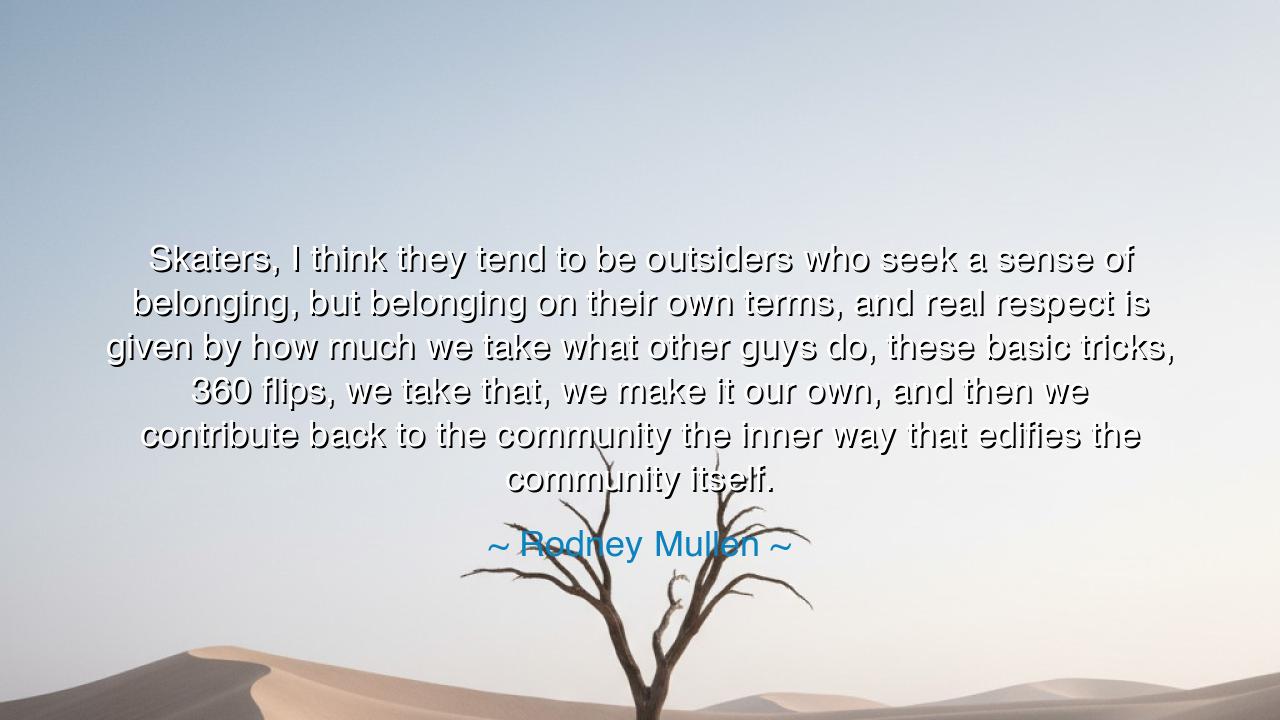
Skaters, I think they tend to be outsiders who seek a sense of
Skaters, I think they tend to be outsiders who seek a sense of belonging, but belonging on their own terms, and real respect is given by how much we take what other guys do, these basic tricks, 360 flips, we take that, we make it our own, and then we contribute back to the community the inner way that edifies the community itself.






The words of Rodney Mullen—“Skaters, I think they tend to be outsiders who seek a sense of belonging, but belonging on their own terms, and real respect is given by how much we take what other guys do, these basic tricks, 360 flips, we take that, we make it our own, and then we contribute back to the community the inner way that edifies the community itself.”—are more than a reflection on skateboarding. They are a philosophy of life itself, spoken by one who stood at the edge of culture and carved a new path through courage and creativity. Here is the voice of an innovator, teaching that true greatness lies not in imitation alone, but in transformation—taking what exists, reshaping it with one’s own soul, and giving it back in a way that strengthens the whole.
The ancients understood this pattern well. The philosopher did not invent wisdom out of nothing; he received the thoughts of his teachers, reshaped them through his own reason, and then passed them on, enriched, to his disciples. The warrior did not fight alone, but learned the art of the sword from those before him, added his own cunning, and then left behind new strategies for future generations. Mullen speaks the same truth in the tongue of the skater: the 360 flip, the basic trick, is not the end but the beginning. To repeat is to learn, but to transform and to contribute is to become worthy of respect.
History gives us parallels. Consider the Renaissance masters—Michelangelo, Leonardo, Raphael—who studied the forms of the ancients, then bent them into new shapes of genius. They were not content to copy; they sought to make the tradition their own and then to edify the community of mankind through art that still stirs the soul centuries later. Mullen’s skater, like the Renaissance artist, stands in this lineage: a figure who honors what came before but insists upon imprinting the uniqueness of his own spirit upon it.
Yet there is another dimension to Mullen’s words: the life of the outsider. Skaters, like poets, prophets, and rebels in every age, do not find their belonging in the easy halls of convention. They gather on the edges—on sidewalks, empty pools, abandoned lots—and there they build their fellowship. But this fellowship is not about surrendering individuality. It is about belonging “on their own terms,” a paradoxical community where authenticity is the highest bond. One is not respected for mere conformity, but for the courage to bring forth one’s true self into the shared circle.
This truth is as old as humanity itself. The early Christians, persecuted in Rome, gathered in catacombs and secret places, not to dissolve into sameness but to share strength while keeping faith with their deepest convictions. The skaters in Mullen’s world echo this ancient pattern: outsiders who create a culture of their own, where respect is not granted by titles or wealth, but by contribution, authenticity, and creativity.
The lesson is profound. In whatever craft or calling you follow, do not merely imitate what others have done. Learn from it, yes; honor it, yes. But then bend it to your spirit, breathe into it your own fire, and return it to the community as something new. For in doing so, you not only elevate yourself—you edify the whole. True respect is not won by hoarding talent, but by enlarging the circle of creation.
Therefore, let us live as Mullen teaches. Be unafraid to stand as an outsider, for from the margins often come the greatest voices. Seek belonging, but never at the cost of your authenticity. Take what the past has given, add to it your own gift, and offer it back—not as a boast, but as a contribution to the living community. In this way, like the skater who transforms a trick into art, you will honor those who came before, enrich those who walk beside you, and inspire those who will follow after.






AAdministratorAdministrator
Welcome, honored guests. Please leave a comment, we will respond soon